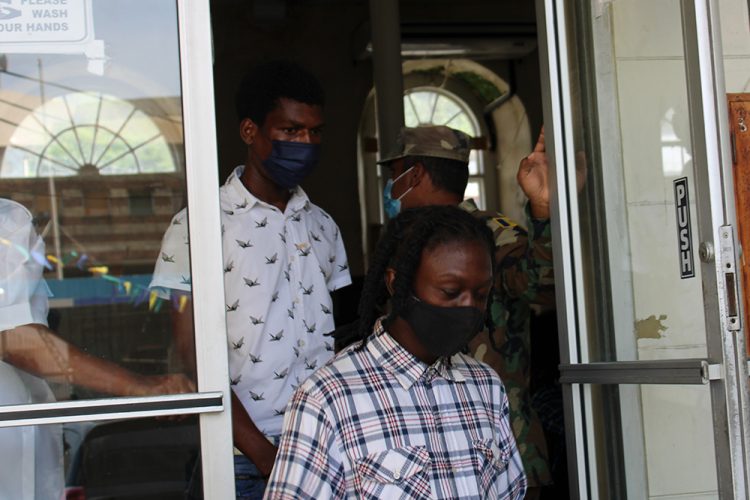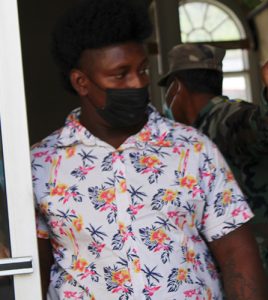Teen robbers get suspended sentences, must compensate victim

The leader of a group of teenagers was 16 years old in 2018 when he and his friends took the decision to rob a woman of her cell phone, by trying to make her believe she was being held at gunpoint.

On August 10 of that year, at about 7:50 p.m, Denise Baptiste, a 34 year old resident of Glen, was sitting on a bench near the Community College in Villa when she was approached and surrounded by three males. One of them had covered his face with a t-shirt, and another had an object wrapped in a t-shirt that was pointed at her.
The object-wielder demanded her phone, but she did not hand it over. However, he took it from her, asking whether it was unlocked and if she had any other objects in her possession.
After checking to make sure that the device was unlocked, the three ran away.
The victim went to the Calliaqua police station and reported the incident, and an investigation was promptly launched.
Information received led the police to the home of 16-year-old Ozem Olliver with a search warrant. Under his bed they found a cellphone and an imitation firearm which the youngster admitted was used to carry out the robbery.
Having checked the serial number on the phone box, Baptiste was able to confirm that the phone was hers.
Further investigations led the officers to 17 year old Andreas Bruce, and D’Andre Peters.
The matter went the processes in the lower courts where it was referred to the High Court where the three accused could enter a plea. They admitted their guilt.
On Monday, October 25, Olliver, now 19 years, and Peters and Bruce, both 20 years, were staring in the face of possible prison time of up to 30 years for robbery, and 25 years for possession of an imitation firearm used in the commission of an offence.
None of the offenders had legal representation, and two of them said they didn’t have anything to say to the court before they were sentenced. However, it was within the court’s interest to ask certain information from them, and so before sentencing them Justice Brian Cottle put some questions to them.
Previously, when the trio entered a guilty plea, there was apparently some mention of them having carried out the activity as part of an initiation to enter a gang.
However, on Monday, Bruce said this was “not really” the case. He explained that he had been working for three years, and was the father of two infant children.
He said he would like to apologise to Baptiste and that he would pay her back for taking the cellphone.
Peters lives at home with his grandparents and uncle, and is not the father of any children. He said he had been working with a ‘trailer truck man’ for over a year. He clarified that he does not want to be a gang member, and that he has changed his lifestyle.
He also apologised and offered to pay Baptiste for the cellphone.
Olliver told the court that he is aware of his foolish actions and has changed his ways. He was asked whether he understood how dangerous his actions were, and that it was entirely possible that a citizen could have shot him believing that he was carrying a firearm. Olliver said he did.
He also disclosed that he is not working, but is furthering his education, and had signed up for college to study automotive repairs.
The youngest offender said that he wanted to deeply apologise to Baptiste, and that he was “truly sorry” for putting her in so much fear.
When sentencing the court also considered submissions by crown counsel Shackell Bobb.
Following the sentencing guidelines, the court firstly considered the consequences of the offence, namely the financial loss of a cellphone worth $1100, and the emotional distress caused. On the other hand, there was no physical injury, nor was excessive violence used.
In those circumstances it would have fallen under the lowest category, but the fact that it was a group activity, and an imitation firearm was used placed the offense in the medium category.
Of a range of 5% to 35% of the maximum penalty, the judge adopted a starting point of 20%, or six years.
Following this, the aggravating and mitigating features were considered including that the trio were still teenagers at the time of the offence.
Olliver was considered to have played a major role because he was the individual with the imitation weapon.
A two year reduction was allowed for Peters and Bruce, and one year for Olliver.
With the one third discount applied for the guilty pleas, sentences were reduced to 32 months for Bruce and Peters, and 40 months for Olliver.
The judge gave special consideration to the fact that they were still in secondary school at the time of the offences, had clear records, and had expressed remorse, which led him to conclude that they were good candidates for rehabilitation. He reduced Olliver’s sentence to 36 months.
The judge handed down a sentence of three years for Olliver and two years, eight months for his co-accused, all suspended, meaning that the sentences will take effect only if another offence is committed within three years. Compensation was also ordered.
For possession of an imitation weapon they were each sentenced to two years in prison, suspended for three years.
“Gentlemen you have the keys to the prison in your hands,” the Judge told them.









